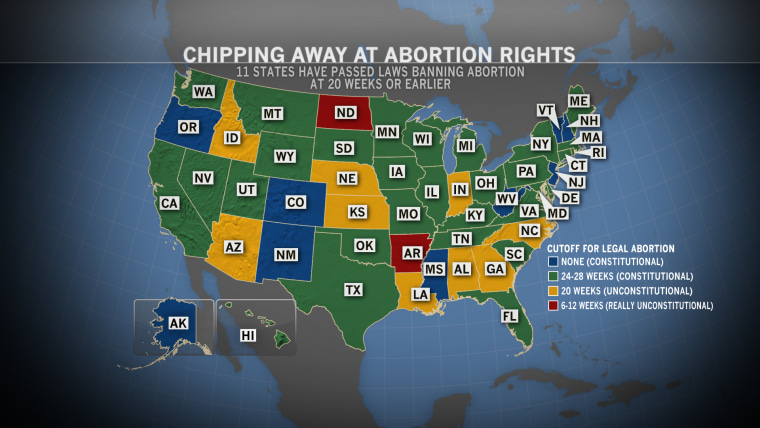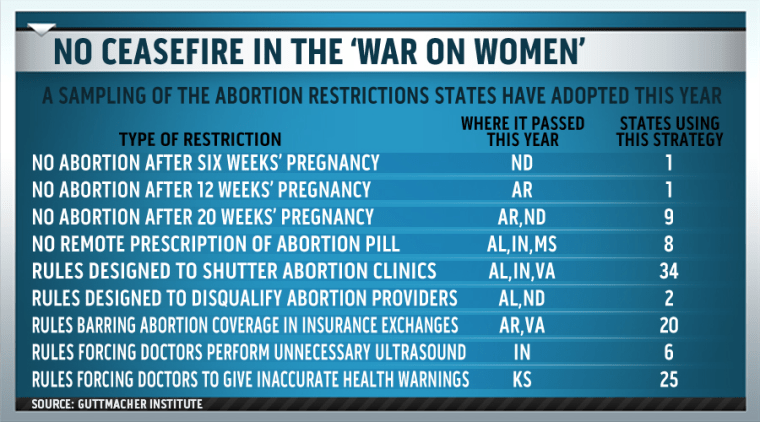Six months ago, the Republican war on women seemed ripe for a ceasefire. The party’s two-year assault on reproductive rights had yielded hundreds of new state laws restricting women’s access to abortion, birth control and other basic health services. It had also alienated moderates and women in droves, undermining Mitt Romney’s bid for the White House. “If there is any lesson conservatives ought to have learned from the past four years, it is the danger of succumbing to angry emotion,” former Bush adviser David Frum wrote in a postmortem on his party’s dismal showing in the 2012 election. “We’ve had four years of self-defeating rage. Now it’s time for cool.”
Yet by all indications, defeat has only hardened the party’s resolve to drive a diverse, modern democracy back to the pre-feminist past. In 2011 and 2012, Republican state legislators voted to restrict women’s reproductive rights at a pace not seen since the early 1980s. And the 2013 legislative season is now shaping up to be just as bad. By health advocates’ latest count, state legislators have introduced more than 300 bills to limit abortion access this year. Dozens of measures—some flagrantly unconstitutional—have been signed into law, and more are in the works, including a new congressional crusade for a national 20-week ban.
Related: Kamikaze conservatism: Why the GOP can't stop talking about rape
The most brazen attacks have come from North Dakota and Arkansas, both of which defied the U.S. Supreme Court by banning abortion after six to 12 weeks’ pregnancy. A federal district court has blocked the Arkansas law until it is tested in court, and no one (including Governor Jack Dalrymple) seriously expects the North Dakota law to take effect as scheduled August 1. Both measures are designed to provoke lawsuits that will make their way to the Supreme Court, prompting a reconsideration of Roe v. Wade.
But these moon-shot abortion bans are just the flashiest features of a broader campaign. The 1973 Roe decision enshrined every woman’s right to terminate a pregnancy until the fetus is viable outside the womb—a threshold normally crossed at 24 weeks. But as this map shows, nine states have recently adopted laws that ban abortion after 18 to 20 weeks of pregnancy, on the discredited theory that a 20-week-old fetus can perceive pain. Some allow exceptions for women whose own health is in danger.

The “atrocities” Perry touts were those of Kermit Gosnell, a rogue Philadelphia clinic operator recently convicted of racketeering, conspiracy and infanticide (for aborting fetuses more than 24 weeks old and murdering those delivered alive). Gosnell had nothing to do with the women’s-health community or the mainstream medical profession, which have condemned him as loudly as anyone. But the religious right has seized on his case to promote the myth of a national “atrocity industry” that must be stopped.
The 20-week crusaders include Trent Franks, an Arizona congressional representative whose “Pain-Capable Unborn Child Protection Act” passed the House Judiciary Committee Wednesday and now heads for the full RepublicanHouse. In an apparent bid to top Perry’s wild rhetoric, Franks accused women who terminate 20-week pregnancies of “knowingly subjecting our innocent unborn children to dismemberment in the womb . . . when they have developed to the point that they can feel excruciating pain every terrible moment leading up to their undeserved deaths.” (He also echoed Rep. Todd Akin’s ludicrous assertion that women’s bodies simply reject unwelcome sperm, saying that “the incidence of rape resulting in pregnancy are very low.”)
Related: New abortion restrictions set to become law in Wisconsin
In truth, less than 2% of U.S. abortions occur after the 20-week mark, and many involve women facing extreme health risks or carrying fetuses with catastrophic birth defects. As Planned Parenthood notes in a statement on the Franks act, states with 20-week bans have forced women and families into “heartbreaking and tragic situations—needing to end a pregnancy for serious medical reasons, but unable to do so.” For a firsthand account of the realities surrounding later-stage abortion, read the story of how an Arkansas couple—an Air Force pilot and surgical nurse—decided to have one before Arkansas adopted its 20-week ban. “This is not an argument about unwanted children,” the pilot writes. “It is about the right of parents and their doctors to make educated and moral decisions with all the facts.”
It’s also about the Constitution. Though nine states have enacted 20-week bans, federal courts have overturned them in Arizona and Idaho, and a state court has blocked Georgia’s to allow for a legal challenge. The six-and 12-week bans are even less likely to survive legal scrutiny, and the federal ban headed for the House floor has little chance of passing the Senate, let alone becoming law.

“The restrictions we’ve seen this year are part of a cumulative set of restrictions,” the ACLU says in a legislative tally released Thursday. “These restrictions add up to a national picture of fewer clinics, more obstacles for health care and women being told that we are too stupid to make decisions for ourselves. It’s high time for extremist politicians to withdraw their troops from the war on women because we are paying attention and we will continue to resist their efforts.”
Don’t bet on a “withdrawal of extremist troops”—defeat only inflames their rage. But as reasonable Republicans now acknowledge, rage is a road to irrelevance.
